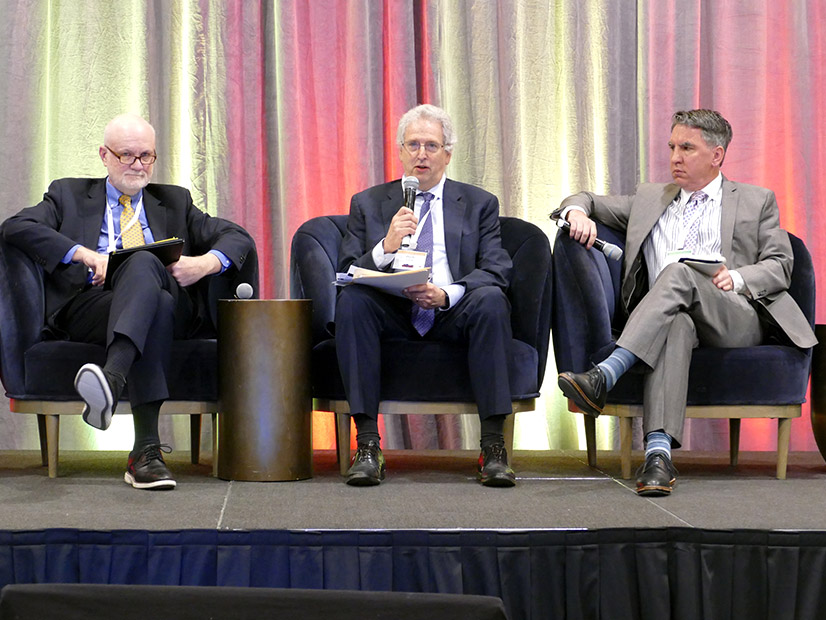
VAIL, Colo. — Former FERC Chair Richard Glick faced off against his old colleague, Commissioner Mark Christie, over FERC Order 1920 in the general session of the Western Conference of Public Service Commissioners’ annual summit May 21.
The order, which directs regional transmission planners to alter their processes to be more forward-looking and proactive, stemmed from a Notice of Proposed Rulemaking issued in 2022 under Glick’s leadership and with Christie’s enthusiastic support because of its consideration of state input. But Christie dissented from the order, which didn’t contain the provisions that had led to him voting for the NOPR. (See FERC Issues Transmission Rule Without ROFR Changes, Christie’s Vote.)
“The NOPR gave states a very significant role, particularly in the key functions of the selection criteria for determining what projects go into the regional plan,” Christie said. It also gave states the ability to choose benefits, of which the rule outlines seven, that are key in determining who pays for transmission.
“The rule actually mandates benefits, which NARUC [the National Association of Regulatory Utility Commissioners], specifically in their comments, said, ‘Don’t mandate benefits; let each region decide what works for them.’ The rule went in the opposite direction,” Christie said. “And of course, the most important issue of all is cost allocation. The NOPR promised that states would consent. … That was critically important to NARUC; it was critically important to every state organization; and it was critically important to me.”
Order 1920 gives states six months to agree on a cost allocation mechanism with regional transmission planners, who must come up with a default ex ante method. Departing from the NOPR, regional planners are not required to file any agreement with the states or even any state proposals as alternatives.
“What this rule does is leave states in the position of just being a stakeholder,” Christie said.
But Glick defended the order and expressed uncertainty about the role of the six-month timeline, which, according to Christie, would be “extraordinarily difficult” for states to reach an agreement in.
“Heck, I don’t know if six months is too long or too short, but at least there’s an opportunity to get together,” Glick said. “The states have an opportunity in this engagement process to come up with a state agreement cost allocation approach and process.”
Christie also took issue with elimination of the FERC Order 1000 cost allocation principle 6, which held that transmission providers could have a different allocation process for public policy projects. In Order 1920, all projects are in the same bucket, “which is going to make it extremely difficult in the real-world practical application determining how much of a cost in one of these long-term projects is actually public policy,” Christie said.
Glick emphasized that the benefits are for the purpose of project selection, not for the purpose of allocating transmission costs.
‘Massive Wealth Transfer’
Mandating benefits and minimizing state consent over cost allocation will be problematic for the consumers who will bear the burden of transmission costs, argued Vincent Duane, principal at Copper Monarch and former general counsel for PJM. He joined Glick and Christie on the panel.
“The way this rule is drawing a lot of criticism, and in my opinion rightly so, is that it does potentially represent a massive wealth transfer away from generation developers … and picked up by customers,” Duane said.
Christie agreed. “This rule is absolutely about a massive transfer of wealth from consumers to developers, no question about it,” he said.
Glick again pushed back, saying the rule will ensure that costs can only be allocated to customers to the extent they benefit.
“It’s not a wealth transfer,” he said. “The customers are only going to have to pay where they benefit.”
To ensure protection of consumers, Christie said state regulators should have a more robust role than the order gives them.
Duane boiled the conversation down to weighing the inevitable compromises that will be made as Western electricity markets expand and utilities and power providers decide which day-ahead market to join.
“There’s going to be some degree of surrendering of state sovereignty as a result of regionalizing. … There’s going to be some potential that you’re going to be told you’re a beneficiary when you may not feel you’re a beneficiary,” Duane said. “As state policymakers, the question you’re facing is, do the benefits of being a part of a regional organization that plans regionally across multiple jurisdictions — that requires some give and take, and some rough and tumble, and some unscientific, at the end of the day, benefits and costs — is it worth it?”


